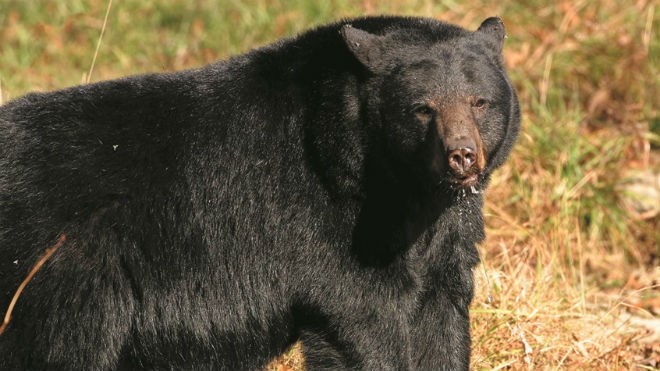While social media has been rife with stories of human and bear encounters in recent weeks in Greater Sudbury, a black bear researcher says it's important to remember that attacks on humans are extremely rare.
Mike Commito said there's no doubt that bears can be aggressive in their pursuit of food, particularly this time of year before they can start feeding on berry crops.
"Bears are pretty tenacious creatures,” Commito said Tuesday. “If there is a food source that they're able to get at, they will do so. "But bear attacks are extremely rare. You're much more likely to die of a bee sting or attacked by a dog."
While the prevalence of bear-human encounters in the North is often blamed on the cancellation of the spring bear hunt in 1999, Commito said the real picture is more complicated. In fact, shortly after the hunt was cancelled, the fall hunt was extended by a month, and the number of bear tags was increased. So the number of bears being harvested each year is about the same as it was before the spring hunt ended.
A bigger factor, he said, is conditions in the forest and the lost of natural habitat as humans encroach in areas where bears traditionally find food.
"These sorts of conflicts are caused by a lack of natural food sources,” Commito said. “In years like this one, and last year, when we had really harsh winters, when the bears come out of hibernation, their food sources are not readily available."
So they are forced to venture farther out in search of something to eat, greatly increasing the likelihood of coming into conflict with people.
Greater Sudbury Const. Bert Lapalme said while the numbers are still fairly high, the number of nuisance bear calls have actually decreased this year compared to 2014. Between June 1 and July 14 this year, police received 210 calls, compared to 228 in the same period last year.
"We're actually slightly lower than last year," Lapalme said.
Since the MNR stopped responding to bear calls a few year ago, an increasing amount of police resources have been diverted to responding to the calls.
Lapalme said they only send a car out when the situation requires it.
"We certainly cannot attend all of these calls,” he said. “If it's not an emergency situation and people can out wait the bear, it's certainly what our callers are asked to do.
“So if people can give time for the bear sniff around and hopefully does not find what they're looking for, they will venture elsewhere."
The best way to prevent problems is to ensure the bears don't have easy access to food, which means keeping garbage and other sources such as bird feeders indoors at night.
"The message doesn't change," Lapalme said. "I know a lot of people do the right things. But if at some point, the bear found a food source somewhere, apparently they have a great memory and they tend to come back."
As their food in their natural habit becomes more readily available as the summer wears on, he said the number of encounters should ease.
"I think things can only improve as the berries start really coming out in the woods," he said. "Hopefully the bears will start finding food in their own habitat so they won't have to come out in populated areas."
"My sense is as some these berry crops come in this time of year, that gives them more of a reason to stay closer to home to access those food sources,” Commito agreed. “But again, this can still happen at any time of the year. If the attractants are available, they will roam to get access to that."
And while the human-bear encounters can be frightening, he said the animals are an important part of our natural heritage.
"As much as we don't want to have these problems, I think many of us in the North would agree we don't want to just see all the bears gone,” Commito said.
"So it's important to try and minimize the attractants we have in our cottages or our yard so that you don't give them that invitation."
Safety tips if you should encounter a bear:
- Remain calm. Often the bear is just passing through. If it doesn’t find a food source, it will move on.
- Drop any food you are carrying. Empty your pockets, drop your lunch or knapsack to the ground.
- Slowly back away. Don’t turn your back and do not run.
- Warn others to keep away. Make loud noises.
- Tell your neighbours a bear is in the area.
- It's scared, intimidated or harassed (for example, a person or dog enters its personal space).
- It's defending itself, its food (carcass, garbage) or their cubs.
- The bear’s escape route is cut off.
- To report a non-emergency bear problem, call the Bear Wise reporting line, 1-866-514-2327, now until Nov. 30. Only call 911 if there's an emergency.
